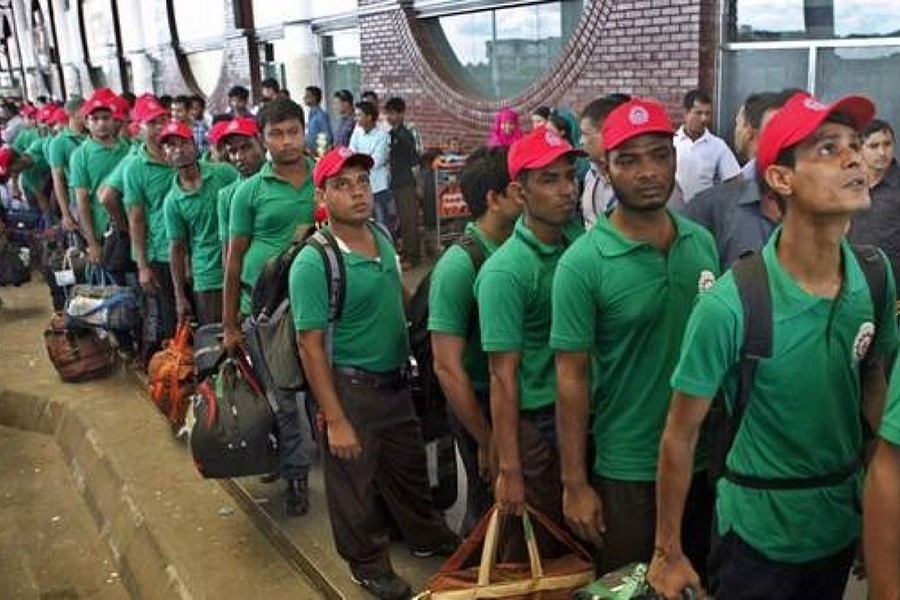Bangladesh nationals employed abroad sent home a record amount -- US$22 million -- in the year 2020. The reason behind their remitting such a large amount during a year that saw a pandemic playing havoc with life and living across the globe remains to be an issue of intense study.
The higher remittance inflow proved many soothsayers wrong. The World Bank in April last year had predicted a 22 per cent decline in remittance income to US$14 billion in 2020 because of the pandemic.
The remittance income provided the much-needed cushion to an otherwise difficult economic situation. Such a huge remittance was an unexpected one. With exports recording a negative growth, the country's overall balance of payments (BoP) would have faced an erosion without a hefty remittance inflow. It needs to be noted here that imports also slowed down in the last calendar year because of the pandemic effect, thus, negating, to some extent, the impact of the downturn in exports.
Expatriate Bangladeshis have been making a notable contribution to the country's economy. Without remittance money, it would not have been possible for it to reach the present status. The remittance money has changed the rural landscape and also the poverty situation. Without a healthy and regular remittance income, the country's dream of becoming a middle-income developing country would have been a distant one.
It is thus pertinent to ask how is the government paying back to the expatriate workers? How is it helping the workers seeking to go abroad with jobs?
The government, as happens in most cases, might give lengthy replies to these questions. It might also claim to have taken a host of measures for the welfare of expatriate workers.
However, there is always a large gap between words and deeds. A case in point is the financing the outbound journeys of the migrant workers.
The rates of migration to Gulf countries and Malaysia fixed by the government are very much affordable. Unfortunately, private recruiters and their agents collect fees three to four times more than the official ones. Only the workers who secure jobs through the state recruiting agency --- the Bangladesh Overseas Employment and Services Limited (BOESL) are lucky ones. They pay a small amount of money against visa fee, airfare and relevant other expenses.
Mobilising funds to pay the local recruiters has always been a big problem for people looking for jobs abroad. The vast majority of migrant workers come from poor and low-income families. They either have to sell or mortgage land and other valuables or borrow from relatives and friends or non-government organisations or money lenders.
When people go abroad with jobs, they have big dreams. But many of them get cheated and return home empty-handed. Some others find the wages too small to repay loans. In the process, families of many migrant workers turn paupers.
What people wanting to go abroad with jobs need is financing from formal institutions such as banks. The government had felt the necessity and created a specialised financing institution called Probashi Kallyan Bank (PKB) in 2010. The question is: Is the bank meeting the main objective behind its creation?
If not others, the Bangladesh Bureau of Statistics (BBS) says that the bank's role in offering loans to outbound workers is still highly insignificant.
A survey carried out by the BBS showed that banks are meeting only 3.7 per cent of the recruitment expenses of the outbound workers.
The large part of such expenses, more than 41 per cent, is met by friends and relatives. NGOs and money lenders provide nearly 36 per cent of the expenses. Migrants' families mobilise 14.4 per cent of the expenses through mortgaging land or other valuables.
At least a couple of reasons are held responsible for insignificant financing by the specialised bank. Firstly, most outbound workers are not aware of the existence of the bank and, secondly, the bank, as alleged by some loan seekers, is not adequately responsive to the loan prayers from the migrant workers. Moreover, the bank reportedly asks the loan-seekers to provide collaterals.
In sum, the process of getting loans by outbound workers from the formal financial institutions is cumbersome and time-consuming. Most migrant workers and their families being illiterate consciously avoid complicated things. They do it instinctively.
The PKB has lent only Tk 500 million until now. The amount was far less---Tk140 million --- until November last. There is no denying that the bank has to exercise caution in lending since it needs to recover loans from the borrowers on time. Yet it should encourage the genuine migrant workers, particularly those with valid employment contracts and visas, to take loans.
Such lending has a positive side also. In this case, the migrant workers wanting to take bank loans would be cautious about the recruiting agencies. For they know, the banks would lend money after being satisfied with employment and relevant other documents.


